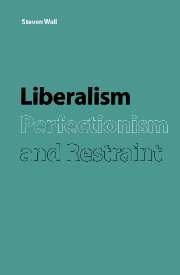Part I - The rejection of the bracketing strategy
Published online by Cambridge University Press: 09 November 2009
Summary
Having clarified perfectionism, I now will examine in some detail its strongest rival. This is a version of anti-perfectionist political morality that I will term the bracketing strategy. The distinguishing feature of the bracketing strategy is the claim that citizens in modern western societies have compelling moral reasons to exercise a special type of restraint.
Chapter 2 clarifies the nature of this restraint and distinguishes several understandings of it. Chapters 3–5 then consider and reject the main arguments in its favor. The examination of these arguments will strongly suggest that no convincing case has so far been made to justify the claim that citizens in modern western societies act wrongly if they do not acknowledge the type of restraint recommended by the bracketing strategy.
Since its distinctive feature is not rationally grounded, I will conclude that the bracketing strategy lacks justificatory force and that, therefore, we ought to reject it. This negative conclusion provides indirect support for the substantive perfectionist views defended in Part II.
- Type
- Chapter
- Information
- Liberalism, Perfectionism and Restraint , pp. 27 - 28Publisher: Cambridge University PressPrint publication year: 1998



